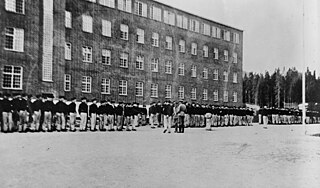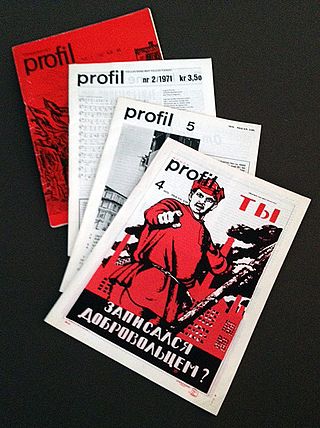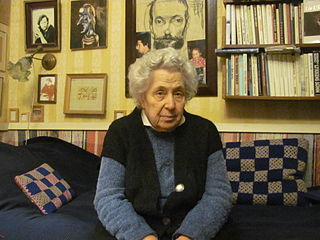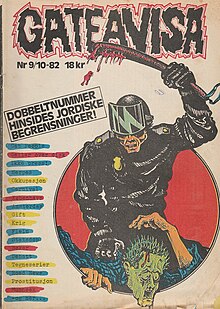
Dag Solstad is a Norwegian novelist, short-story writer, and dramatist whose work has been translated into 20 languages. He has written nearly 30 books and is the only author to have received the Norwegian Literary Critics' Award three times.

Grini prison camp was a Nazi concentration camp in Bærum, Norway, which operated between 1941 and May 1945. Ila Detention and Security Prison is now located here.

Ole Christian Paus was a Norwegian singer, songwriter, poet and author, who was widely regarded as the foremost troubadour of the contemporary Norwegian ballad tradition.

GeirThomas Hylland Eriksen is a Norwegian anthropologist known for his scholarly and popular writing on globalization, identity, ethnicity, and nationalism. He is currently Professor of Social Anthropology in the Department of Social Anthropology at the University of Oslo. He has previously served as the President of the European Association of Social Anthropologists (2015-2016), as well as the Editor of Samtiden (1993-2001), Norsk antropologisk tidsskrift (1993-1997), the Journal of Peace Research, and Ethnos.
Ny Tid is Norway's largest international quarterly review of non-fiction books – up to 50 in each issue. It is currently owned by Ny Tid & Orientering AS.

Dag Herbjørnsrud is a historian of ideas, author, a former editor-in-chief, and a founder of Center for Global and Comparative History of Ideas in Oslo. His writings have been published by Aeon, the American Philosophical Association (APA), Dialogue and Universalism, Cosmopolis, etc., and he was formerly a columnist for Al Jazeera English. Herbjørnsrud was the guest editor of a special issue of the bilingual journal Cosmopolis (Brussels), on "Decolonizing the Academy"; one of his contributors was the author and Professor Ngũgĩ wa Thiong'o. He sits on the Editorial Review Board of the book series Global Epistemics at Rowman & Littlefield.

Olav Dalgard was a Norwegian literary and art historian, filmmaker, author and educator.

The Brage Prize is a Norwegian literature prize that is awarded annually by the Norwegian Book Prize foundation. The prize recognizes recently published Norwegian literature.

Profil was a Norwegian literary magazine which had great influence in the late 1960s and the 1970s. The magazine was founded in 1938 as Filologen, a house organ for the Faculty of Humanities at the University of Oslo. Its name was changed to Profil in 1959. In 1966 the magazine was taken over by a group of radical students. They opposed established literary views, and introduced the modernist literature. The circle of writers that emerged are often referred to as the "Profil Generation".
Viking Mestad was a Norwegian banker and politician for the Liberal Party.
Events in the year 1962 in Norway.
Samtiden is a Norwegian political and literary magazine.
Spynorsk mordliste is a derogatory term meant to disparage Nynorsk, one of the two official standards of written Norwegian. It is a pun on Nynorsk ordliste, the title of the "New Norwegian Word List", a Nynorsk dictionary.

Audhild Gregoriusdotter Rotevatn is a Norwegian journalist, television host, and radio presenter, who has worked for the Norwegian Broadcasting Corporation and the now defunct Kanal 24. She is known for her unusual name and consistent use of Nynorsk.
The Research Council of Norway's Award for Excellence in Communication of Science is awarded annually by the Research Council of Norway, a Norwegian government body. According to its bylaws, the prize is to be given in order to "reward and stimulate the dissemination of research to a broad audience. The dissemination must be of high quality in both form and content." The price is worth 500000 kr.
Anarchism in Norway first emerged in the 1870s. Some of the first to call themselves anarchists in Norway were Arne Garborg and Ivar Mortensson-Egnund. They ran the radical target magazine Fedraheimen which came out 1877–91. Gradually the magazine became more and more anarchist-oriented, and towards the end of its life it had the subtitle Anarchist-Communist Body. The anarchist author Hans Jæger published the book "The Bible of Anarchy" in 1906, and in recent times Jens Bjørneboe has been a spokesman for anarchism – among other things in the book "Police and anarchy".

Hjelmsgate 3 is a self-managed social centre in Oslo, Norway. The wooden house was constructed in 1858 and from the late 1960s onwards it has been a central node in the Norwegian counterculture.

Lyubov "Lyuba" Gorlina was a Russian translator.
Tord Larsen is a Norwegian social anthropologist. He is professor emeritus of social anthropology at the Norwegian University of Science and Technology (NTNU).

Vestfold is one of the 19 multi-member constituencies of the Storting, the national legislature of Norway. The constituency was established in 1921 following the introduction of proportional representation for elections to the Storting. It consists of the municipalities of Færder, Holmestrand, Horten, Larvik, Sandefjord and Tønsberg in the county of Vestfold. The constituency currently elects six of the 169 members of the Storting using the open party-list proportional representation electoral system. At the 2021 parliamentary election it had 182,961 registered electors.













